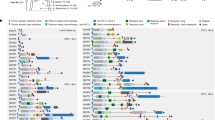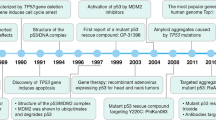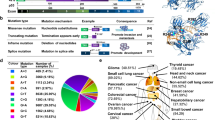Abstract
The cyclin-dependent kinase inhibitor p16 (p16INK4A/CDKN2/MTS1) is a potent inhibitor of the cyclin D-dependent phosphorylation of the retinoblastoma gene (Rb) product, the inactivation of which induces loss of Rb-dependent G1 arrest through inappropriate phosphorylation of the Rb protein. To analyse the role of p16INK4A as a tumor suppressor in the genesis of non small cell lung cancers (NSCLC) and correlate loss of p16INK4A protein expression to genetic or epigenetic mechanisms, we have performed a comprehensive study of p16 status in a series of 43 NSCLC. To this end, we have investigated p16INK4A protein expression with immunohistochemistry, deletions of the gene by FISH, and determined the methylation status of exon 1α using a PCR-based methylation assay. Finally, possible mutations were studied by SSCP and subsequent sequencing. Twenty one of the 43 (49%) NSCLC studied exhibited an absence of p16INK4A nuclear staining. Of these, three (14%) had frameshift or missense mutations, seven (33%) displayed methylation of exon1α and 10 (48%) displayed homozygous deletions. In total, 95% of the tumors with p16INK4A negative staining carried one of these three alternative genetic or epigenetic alterations. Furthermore, a high degree of chromosome 9 polysomy was found (58%) in those tumors with p16INK4A inactivation. Taken together these results suggest that deregulation of the p16 gene locus is a frequently occurring event in NSCLC through distinct mechanisms including rare point mutations, promotor methylation and frequent homozygous deletions. Furthermore, our data show that immunohistochemistry is a rapid and an accurate technique for screening of p16INK4A gene inactivation events that result in loss of protein expression.
This is a preview of subscription content, access via your institution
Access options
Subscribe to this journal
Receive 50 print issues and online access
$259.00 per year
only $5.18 per issue
Buy this article
- Purchase on Springer Link
- Instant access to full article PDF
Prices may be subject to local taxes which are calculated during checkout
Similar content being viewed by others
Author information
Authors and Affiliations
Rights and permissions
About this article
Cite this article
Gazzeri, S., Gouyer, V., Vour'ch, C. et al. Mechanisms of p16INK4A inactivation in non small-cell lung cancers. Oncogene 16, 497–504 (1998). https://doi.org/10.1038/sj.onc.1201559
Received:
Revised:
Accepted:
Published:
Issue Date:
DOI: https://doi.org/10.1038/sj.onc.1201559
Keywords
This article is cited by
-
Impact of Concurrent Genomic Alterations Detected by Comprehensive Genomic Sequencing on Clinical Outcomes in East-Asian Patients with EGFR-Mutated Lung Adenocarcinoma
Scientific Reports (2018)
-
Objective response to mTOR inhibition in a metastatic collision tumor of the liver composed of melanoma and adenocarcinoma with TSC1 loss: a case report
BMC Cancer (2017)
-
Control of stress signaling in stem cells: crossroads of stem cells and cancer
Tumor Biology (2016)
-
A carbazole alkaloid deactivates mTOR through the suppression of rictor and that induces apoptosis in lung cancer cells
Molecular and Cellular Biochemistry (2015)
-
Strong expression of cyclin B2 mRNA correlates with a poor prognosis in patients with non-small cell lung cancer
Tumor Biology (2014)



